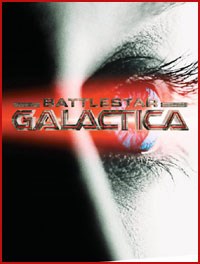 You may think me a bit mad (especially if you aren’t into science fiction), but I’m telling you that the Sci-fi Channel’s Battlestar Galactica is one of the best shows on television. It’s received heaps of critical acclaim for its acting, writing, cinematography and scores. But while the show has merits on its own, I find it particularly intriguing because it often raises untidy and thought-provoking issues about faith.
You may think me a bit mad (especially if you aren’t into science fiction), but I’m telling you that the Sci-fi Channel’s Battlestar Galactica is one of the best shows on television. It’s received heaps of critical acclaim for its acting, writing, cinematography and scores. But while the show has merits on its own, I find it particularly intriguing because it often raises untidy and thought-provoking issues about faith.Light years from last century’s campy and kitsch BG, Sci-fi’s BG seriously (and impressively) explores (among other things) why we fight and kill each other. In this century’s BG, the survivors of a polytheistic humanity struggle to survive the jihad of the monotheistic, now soul-burdened Cylons who are (this is important) indistinguishable in appearance from humans. The series’ creators have completely removed race, in its traditional sense, from the picture and reduced cultural differences to a minimal factor. Instead, the series poses, if we don’t fight because we look different, why do we fight?
Faith plays heavy in this on-going exploration, so it gets quite a bit of air-time, both in the personal lives of the characters as well as a larger movement and motivation in the battle between the two groups. Not only does this show deal with faith issues more often, but I think it does a better job of exploring the issues than many other shows out there, including Lost.
Now, since I’m a sci-fi geek, I’m aware that the original series robbed a lot from Mormonism and Greek/Roman religions. This century’s BG is an even greater mishmash of religions, adding elements of Christian, Islamic and Eastern faiths as well. For example, the Cylon faith (a new feature of this century's BG, btw) has elements of these three: their belief in one God is similar to Christian and Islamic monotheism; Cylons consistently use language common to evangelical and fundamental Christians; the Cylon quest to wipe out humanity is seen by many critics as similar to Islamic jihad; and the Cylon process of “dying” and being “resurrected” is a tip to reincarnation.
But I’m not so much interested in what particular religions are represented or how they are mashed together (that's nothing new in our culture) as I am intrigued by the questions that the stories pose. Among the humans, the central struggle is whether or not to believe there is something beyond the five senses—and if there is, does it/they care? Among the Cylons, that isn't an issue; instead, their struggle is more about "what does that God want of us" and "how then should we live?" As we go from one story to the next, characters explore these questions—and sometimes, it makes me explore them too.
One of my on-going questions is: how does my faith and trust in Jesus play out in my everyday life? The question of faith’s role in life surfaces often on BG. As a result, you’ll see a lot more about BG on this blog.
(A friendly warning: Battlestar Galactica episodes may contain violent and sexual situations. Use discretion in your viewing choices.)
image above: © 2003 Sci Fi Channel. All Rights Reserved bsgctgy